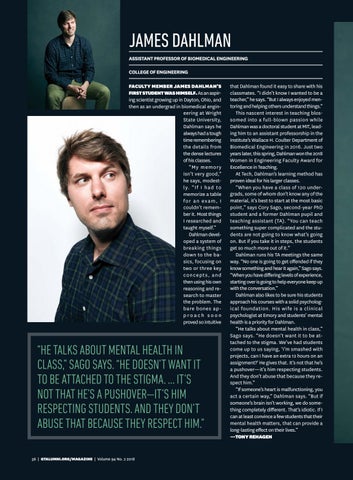JAMES DAHLMAN ASSISTANT PROFESSOR OF BIOMEDICAL ENGINEERING COLLEGE OF ENGINEERING FACULTY MEMBER JAMES DAHLMAN’S FIRST STUDENT WAS HIMSELF. As an aspiring scientist growing up in Dayton, Ohio, and then as an undergrad in biomedical engineering at Wright State University, Dahlman says he always had a tough time remembering the details from the dense lectures of his classes. “My memory isn’t very good,” he says, modestly. “ I f I h a d t o memorize a table for an exam, I couldn’t remember it. Most things I researched and taught myself.” Dahlman developed a system of breaking things down to the basics, focusing on two or three key concepts, and then using his own reasoning and research to master the problem. The bare bones approach soon proved so intuitive
“HE TALKS ABOUT MENTAL HEALTH IN CLASS,” SAGO SAYS. “HE DOESN’T WANT IT TO BE ATTACHED TO THE STIGMA. ... IT’S NOT THAT HE’S A PUSHOVER—IT’S HIM RESPECTING STUDENTS. AND THEY DON’T ABUSE THAT BECAUSE THEY RESPECT HIM.” 56 | GTALUMNI.ORG/MAGAZINE | Volume 94 No. 2 2018
that Dahlman found it easy to share with his classmates. “I didn’t know I wanted to be a teacher,” he says. “But I always enjoyed mentoring and helping others understand things.” This nascent interest in teaching blossomed into a full-blown passion while Dahlman was a doctoral student at MIT, leading him to an assistant professorship in the Institute’s Wallace H. Coulter Department of Biomedical Engineering in 2016. Just two years later, this spring, Dahlman won the 2018 Women in Engineering Faculty Award for Excellence in Teaching. At Tech, Dahlman’s learning method has proven ideal for his larger classes. “When you have a class of 120 undergrads, some of whom don’t know any of the material, it’s best to start at the most basic point,” says Cory Sago, second-year PhD student and a former Dahlman pupil and teaching assistant (TA). “You can teach something super complicated and the students are not going to know what’s going on. But if you take it in steps, the students get so much more out of it.” Dahlman runs his TA meetings the same way. “No one is going to get offended if they know something and hear it again,” Sago says. “When you have differing levels of experience, starting over is going to help everyone keep up with the conversation.” Dahlman also likes to be sure his students approach his courses with a solid psychological foundation. His wife is a clinical psychologist at Emory and students’ mental health is a priority for Dahlman. “He talks about mental health in class,” Sago says. “He doesn’t want it to be attached to the stigma. We’ve had students come up to us saying, ‘I’m smashed with projects, can I have an extra 12 hours on an assignment?’ He gives that. It’s not that he’s a pushover—it’s him respecting students. And they don’t abuse that because they respect him.” “If someone’s heart is malfunctioning, you act a certain way,” Dahlman says. “But if someone’s brain isn’t working, we do something completely different. That’s idiotic. If I can at least convince a few students that their mental health matters, that can provide a long-lasting effect on their lives.” —TONY REHAGEN
